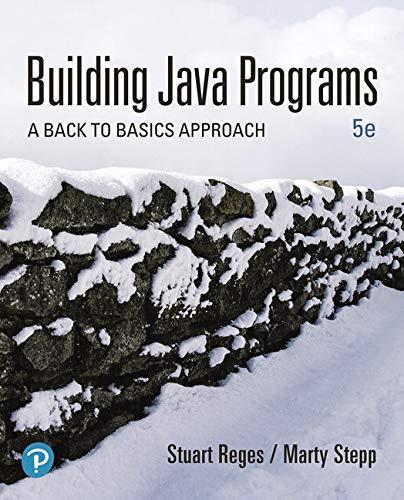
Building Java Programs: A Back To Basics Approach (5th Edition)
5th Edition
ISBN: 9780135471944
Author: Stuart Reges, Marty Stepp
Publisher: PEARSON
expand_more
expand_more
format_list_bulleted
Question
Chapter 14.2, Problem 16SCP
a.
Program Plan Intro
Find output for the given Stack
- Import necessary packages.
- Create a class “StackQu”,
- Define the method “mystery1()” that accepts stack,
- Create the object for “Queue”.
- Execute while stack is non-empty,
- Find the value of top of “Stack”.
- Add the value into the “Queue”.
- Again add the same value into the “Queue”.
- Execute while queue is non-empty,
- Add the element removed from the queue into the “Stack”.
- Print stack.
- Define the method “main()”,
- Create object for “Stack”.
- Call the “push()” method of stack to add the elements “2”, “6”, and “1” into the stack one by one.
- Call the method “mystery1()” with stack as a parameter.
- Define the method “mystery1()” that accepts stack,
b.
Program Plan Intro
Find output for the given Stack
Program plan:
- Import necessary packages.
- Create a class “StackQu”,
- Define the method “mystery1()” that accepts stack,
- Create the object for “Queue”.
- Execute while stack is non-empty,
- Find the value of top of “Stack”.
- Add the value into the “Queue”.
- Again add the same value into the “Queue”.
- Execute while queue is non-empty,
- Add the element removed from the queue into the “Stack”.
- Print stack.
- Define the method “main()”,
- Create object for “Stack”.
- Call the “push()” method of stack to add the elements “42”, “-3”, “4”, “15”, and “9” into the stack one by one.
- Call the method “mystery1()” with stack as a parameter.
- Define the method “mystery1()” that accepts stack,
c.
Program Plan Intro
Find output for the given Stack
Program plan:
- Import necessary packages.
- Create a class “StackQu”,
- Define the method “mystery1()” that accepts stack,
- Create the object for “Queue”.
- Execute while stack is non-empty,
- Find the value of top of “Stack”.
- Add the value into the “Queue”.
- Again add the same value into the “Queue”.
- Execute while queue is non-empty,
- Add the element removed from the queue into the “Stack”.
- Print stack.
- Define the method “main()”,
- Create object for “Stack”.
- Call the “push()” method of stack to add the elements “30”, “20”, “10”, “60”, “50”, and “40” into the stack one by one.
- Call the method “mystery1()” with stack as a parameter.
- Define the method “mystery1()” that accepts stack,
Expert Solution & Answer
Want to see the full answer?
Check out a sample textbook solution
Chapter 14 Solutions
Building Java Programs: A Back To Basics Approach (5th Edition)
Ch. 14.1 - Prob. 1SCPCh. 14.1 - Prob. 2SCPCh. 14.1 - Prob. 3SCPCh. 14.1 - Prob. 4SCPCh. 14.1 - Prob. 5SCPCh. 14.1 - Prob. 6SCPCh. 14.1 - Prob. 7SCPCh. 14.1 - Prob. 8SCPCh. 14.1 - Prob. 9SCPCh. 14.1 - Prob. 10SCP
Ch. 14.2 - Prob. 11SCPCh. 14.2 - Prob. 12SCPCh. 14.2 - Prob. 13SCPCh. 14.2 - Prob. 14SCPCh. 14.2 - Prob. 15SCPCh. 14.2 - Prob. 16SCPCh. 14.3 - Prob. 17SCPCh. 14.3 - Prob. 18SCPCh. 14.3 - Prob. 19SCPCh. 14.3 - Prob. 20SCPCh. 14.3 - Prob. 21SCPCh. 14.3 - Prob. 22SCPCh. 14.3 - Prob. 23SCPCh. 14 - Prob. 1ECh. 14 - Prob. 2ECh. 14 - Prob. 3ECh. 14 - Prob. 4ECh. 14 - Prob. 5ECh. 14 - Prob. 6ECh. 14 - Prob. 7ECh. 14 - Prob. 8ECh. 14 - Prob. 9ECh. 14 - Prob. 10ECh. 14 - Prob. 11ECh. 14 - Prob. 12ECh. 14 - Prob. 13ECh. 14 - Prob. 14ECh. 14 - Prob. 15ECh. 14 - Prob. 16ECh. 14 - Prob. 17ECh. 14 - Prob. 18ECh. 14 - Prob. 19ECh. 14 - Prob. 20ECh. 14 - Prob. 21ECh. 14 - Prob. 1PPCh. 14 - Prob. 3PP
Knowledge Booster
Recommended textbooks for you
 Database System ConceptsComputer ScienceISBN:9780078022159Author:Abraham Silberschatz Professor, Henry F. Korth, S. SudarshanPublisher:McGraw-Hill Education
Database System ConceptsComputer ScienceISBN:9780078022159Author:Abraham Silberschatz Professor, Henry F. Korth, S. SudarshanPublisher:McGraw-Hill Education Starting Out with Python (4th Edition)Computer ScienceISBN:9780134444321Author:Tony GaddisPublisher:PEARSON
Starting Out with Python (4th Edition)Computer ScienceISBN:9780134444321Author:Tony GaddisPublisher:PEARSON Digital Fundamentals (11th Edition)Computer ScienceISBN:9780132737968Author:Thomas L. FloydPublisher:PEARSON
Digital Fundamentals (11th Edition)Computer ScienceISBN:9780132737968Author:Thomas L. FloydPublisher:PEARSON C How to Program (8th Edition)Computer ScienceISBN:9780133976892Author:Paul J. Deitel, Harvey DeitelPublisher:PEARSON
C How to Program (8th Edition)Computer ScienceISBN:9780133976892Author:Paul J. Deitel, Harvey DeitelPublisher:PEARSON Database Systems: Design, Implementation, & Manag...Computer ScienceISBN:9781337627900Author:Carlos Coronel, Steven MorrisPublisher:Cengage Learning
Database Systems: Design, Implementation, & Manag...Computer ScienceISBN:9781337627900Author:Carlos Coronel, Steven MorrisPublisher:Cengage Learning Programmable Logic ControllersComputer ScienceISBN:9780073373843Author:Frank D. PetruzellaPublisher:McGraw-Hill Education
Programmable Logic ControllersComputer ScienceISBN:9780073373843Author:Frank D. PetruzellaPublisher:McGraw-Hill Education

Database System Concepts
Computer Science
ISBN:9780078022159
Author:Abraham Silberschatz Professor, Henry F. Korth, S. Sudarshan
Publisher:McGraw-Hill Education

Starting Out with Python (4th Edition)
Computer Science
ISBN:9780134444321
Author:Tony Gaddis
Publisher:PEARSON

Digital Fundamentals (11th Edition)
Computer Science
ISBN:9780132737968
Author:Thomas L. Floyd
Publisher:PEARSON

C How to Program (8th Edition)
Computer Science
ISBN:9780133976892
Author:Paul J. Deitel, Harvey Deitel
Publisher:PEARSON

Database Systems: Design, Implementation, & Manag...
Computer Science
ISBN:9781337627900
Author:Carlos Coronel, Steven Morris
Publisher:Cengage Learning

Programmable Logic Controllers
Computer Science
ISBN:9780073373843
Author:Frank D. Petruzella
Publisher:McGraw-Hill Education